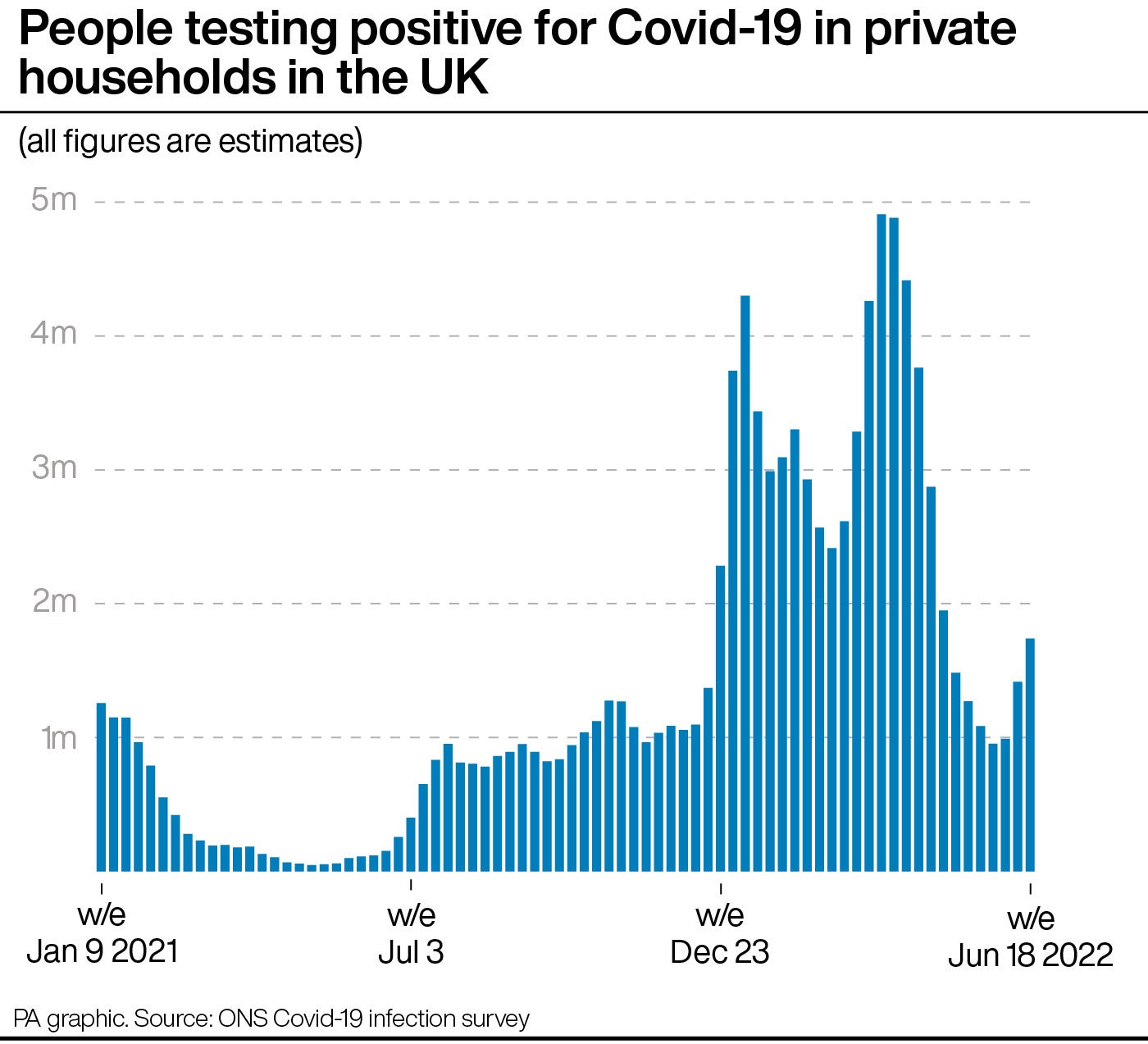
Covid-19 infections are continuing to rise in all four nations of the UK, with the increase likely to be driven by the latest Omicron variants BA.4 and BA.5, figures show.
The number of people in hospital with Covid is also on an upward trend in most parts of the country, suggesting the virus is becoming steadily more prevalent.
Health experts said that while there is “currently no evidence” that BA.4 and BA.5 lead to more serious symptoms than previous variants, nearly one in six people aged 75 and over have not received a booster dose of vaccine in the past six months, putting them more at risk of severe disease.
A total of 1.7 million people in private households are estimated to have had the virus last week, up 23% from 1.4 million a week earlier, according to the Office for National Statistics (ONS).
The rise of 23% is lower than the 43% jump in the previous week’s figures, but it means total infections are now at levels last seen at the end of April.

They are also higher than the peak reached during the second wave of the virus in January 2021.
However, infections are still below the record 4.9 million seen at the peak of the Omicron BA.2 wave at the end of March this year.
The ONS said the latest increase was “likely caused by infections compatible with Omicron variants BA.4 and BA.5”, which are now thought to be the most dominant strains in much of the UK.
The virus continues to be most prevalent in Scotland, where 250,700 people were likely to test positive for Covid-19 last week, or one in 20.
This is up week on week from 176,900, or one in 30, and is the highest estimate for Scotland since mid-April.
In England, 1.4 million people were likely to have had the virus last week, the equivalent of around one in 40.
This is up from 1.1 million, or one in 50 people, the previous week.
Wales has seen infections rise slightly to 68,500 people, or one in 45, up from 64,800, also one in 45.
In Northern Ireland, Covid-19 infections jumped to an estimated 59,900 people, or one in 30, up from 42,900, or one in 45.
The percentage of people testing positive is thought to have increased among all age groups in England and all regions except the North East and South East, where the trend is described by the ONS as “uncertain”.
Infection levels are highest among 25 to 34-year-olds, where 3.3% – one in 30 – were likely to have had the virus last week.
Dr Stephen Griffin of the school of medicine at the University of Leeds, said: “The Omicron subvariants BA.4 and BA.5 are fuelling another wave of infections, our third already this year.
“The rate of reinfection with these variants is also dramatically increased and prevalence is increasing across all ages.
“This highlights the ability of these viruses to evade antibody immunity and the rapidity with which they are causing waves across the globe is concerning.
“Our population immunity and the properties of the virus are continuously changing.
“Comparisons to the pre-vaccine era are of course reassuring, but the idea that this race has been run to the best of our ability is nonsense.
“A pandemic is just that, there are no exceptions until it ends for all.”
Separate analysis published on Friday by the UK Health Security Agency (UKHSA) suggests the Omicron variant BA.5 is growing approximately 35% faster than BA.2, while BA.4 is growing 19% faster – meaning it is likely that BA.5 will soon become the dominant Covid-19 variant in the UK.
Together, BA.4 and BA.5 now make up more than half of new Covid-19 cases in England.
There is “currently no evidence” the two variants cause more serious illness than previous variants, the HSA said.
But nearly one in six people aged 75 and over have not received any dose of vaccine in the past six months, putting them more at risk of severe disease.
Professor Susan Hopkins, UKHSA chief medical adviser, said: “It is clear that the increasing prevalence of Omicron BA.4 and BA.5 are significantly increasing the case numbers we have observed in recent weeks.
“We have seen a rise in hospital admissions in line with community infections but vaccinations are continuing to keep ICU admissions and deaths at low levels.
“As prevalence increases, it’s more important than ever that we all remain alert, take precautions, and ensure that we’re up to date with Covid-19 vaccinations, which remain our best form of defence against the virus.
“Our data also show that 17.5% of people aged 75 years and over have not had a vaccine within the past six months, putting them more at risk of severe disease. We urge these people in particular to get up to date.”
All over-75s in the UK have been offered a “spring booster”, available at least three months after their most recent jab, to ensure they continue to receive the maximum possible protection from the virus.
The number of people in hospital with Covid-19 is now on an upwards trend in most parts of the country.
Some 6,752 patients in England had Covid-19 on June 24, up 34% on the previous week, Government figures show.
In Scotland, 948 patients were recorded on June 19, the latest date available, up 27%.
Wales has seen its number of patients jump 40% week on week, reaching 375 on June 23.
Hospital numbers in all nations had previously been on a steady downwards trend since early April, following the peak of the Omicron BA.2 wave.
The trend in Northern Ireland is uncertain, with numbers levelling off in recent days between 250 and 270.
Most hospital patients who test positive for Covid-19 are being treated primarily for something else, rather than the virus.
But they will need to be kept separate from those patients who do not have Covid, putting extra pressure on hospital staff.







